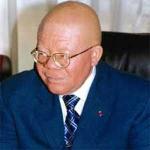29 October 2010
The town of Buea lies at the foot of Mt Cameroon, the highest volcano in West and Central Africa.
In the streets, a number of albinos go about their daily activities. But when the volcano threatens to erupt, they all go underground to avoid being sacrificed to appease the mountain gods.
Elsewhere across the country, albinos are hunted down for their body parts because witchdoctors say they can bring wealth and good luck. In many communities, albino babies are considered signs of misfortune and are buried alive or are denied breast milk.
The situation is not peculiar to Cameroon. In Tanzania, police are holding a Kenyan national arrested earlier this month for trying to sell an albino man for US$250.000. In Burundi last year, 12 albinos were mutilated and their remains sold for use in magical portions.

D. Ntaryike
Jean Jacques Ndoudoumou, president of the World Association for the Defense of the Interests and Solidarity of Albinos (ASMODISA)Albinism is an inherited genetic condition characterized by the absence of melanin, which gives the skin, eyes and hair their color. It can affect all races. But African albinos are especially easy to spot because of their white skin and fair hair.
Natasha Ndalle is a 2005 albino beauty queen in Cameroon's capital Yaounde.
She says about four years ago, a woman came begging for her hair to use in preparing traditional medicine. Natasha says even her own mother admits regularly shaving her hair when she was younger for the same purpose. She says some men, running for elections or seeking job promotions, have offered her huge amounts of money for sex.
Many albinos say they're victims of prejudice. They say they're discriminated against in employment opportunities, blamed for their parents' separation, denied education, and mocked at school because of their skin color and poor sight.
Leading the campaign to defend them is the Cameroon-based World Association for the Defense of the Interests and Solidarity of Albinos, or ASMODISA in French. In early August, the group organized the 13th National Week of Albinos.
This year, the focus was on skin cancer, which the association says is responsible for 70 percent of all albino deaths in Cameroon. The delegates were given free dermatology and ophthalmology consultations and took part in a number of sensitization sessions, as well as sporting and cultural events.
Albinos used the week to urge the government to give them preferential treatment like reduced healthcare costs, better access to education and equal employment opportunities.
The president of ASMODISA is Jean Jacques Ndoudoumou. He is also the manager of the government-run Public Contracts Award Commission.
Ndoudoumou says over time, the plight of albinos in Cameroon is changing, though at a very slow pace. He says the number of albinos graduating from the country's universities is gradually increasing, and reports of the systematic elimination of albino babies are dropping. Ndoudoumou says it's an indication that long years of sensitization are finally beginning to pay off.
The government sent the ministers of health and social affairs to the weeklong ASMODISA activities. It has pledged to support to the association and has promised to examine all complaints.